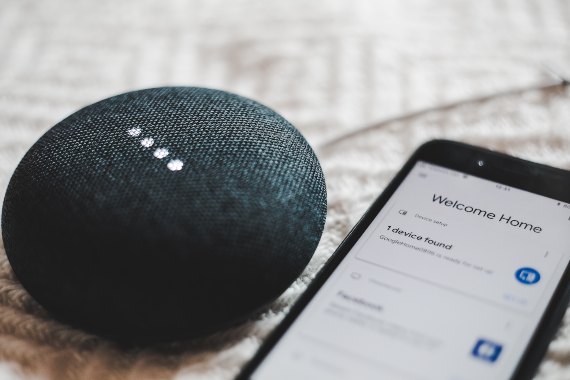You might think of robots taking over the world as something out of a science fiction movie—or at the very least something that won’t happen until, say, 2035. But the fact is, the future is happening right now.
Artificial Intelligence technology has been around for decades, in ways that are a bit more mundane than self-driving cars or facial-recognition tech. Smart tech does so much behind the scenes that you might be surprised to learn how much harder life would be without it.
Here are 10 ways you may already use AI in your daily life—some of which you may not have even realized.
1. Voice Assistants
In today’s homes, people love their smart speakers and voice assistants. According to a recent study from Nielsen, 24% of US households alone own a smart speaker such as a Google Home or Amazon Echo. These assistants, which use natural language processing (NLP) to interpret and respond to voice cues, allow you to play music on demand, remind you to take the trash, or read your kids a bedtime story.
2. Smartphones
There are many ways smartphones use AI, which means you probably use artificial intelligence a few times a day with the touch of a finger. Siri and Google Assistant are already well-known features on cell phones, allowing voice-activated commands and searches. Also, smart selfie enhancements—what occurs when you use portrait mode on your iPhone—are created using AI for perspective identification.

3. Social Media Feeds
Whether you’re a tweeter on Twitter, an Instagram aficionado or a Facebook super-user, your feeds and the notifications you receive are largely curated by artificial intelligence. Your user experience is tailored specifically for you. Each platform wants to give you the information they think you’re looking for so you’ll return often. The next time you find yourself scrolling for hours, you’ll know why.
4. Google Predictive
If you use Google as your search engine, you’ve probably noticed that Google makes recommendations to complete the query based on the text you have typed. This predictive search data appears based on data Google collects about you (and others) as you navigate the web—facts such as your age, location and other personal details. The search engine uses AI to predict what you may be trying to find so it can give you better information.
5. Product Recommendations
Retailers such as Amazon use artificial intelligence to gather information about your shopping habits and preferences so they can personalize your experience online. These recommended products are tailored specifically to your habits and likes, letting you feel like you’re shopping with a personal assistant online. No wonder we keep going back for more.

6. Customer Support
Chatbots help thousands of customers across all industries answer simple support questions. A banking chatbot, for example, can handle simple commands such as showing available balances, transferring funds and closing an account. Bots use AI to help customers find data, but the bot provider also benefits because it can log client usage data and market to their clients for specific needs.
7. Music Recommendations
Who doesn’t love the convenience of having specialized playlists for music preferences? For streaming customers of Spotify and Alexa, AI helps the services learn the different tastes and preferences of individuals to build better playlists. Data such as song length, pitch, genres and more helps these music platforms suggest similar songs and artists.

8. Maps and Directions
AI also plays a big role in navigation systems. Whether you use Google or Apple Maps for navigation, artificial intelligence reads numerous points of data to provide users updated, real-time traffic information. Voice navigation helps drivers follow the most efficient route, and some navigation interfaces can even offer suggestions of routes to locations you frequent.
9. Home Automation
Keyless entry and voice-control lights are becoming the norm for today’s homeowner—all thanks to AI. Now there are entire protocols like Z-Wave that allow homeowners to build their own personal Internet of Things (IoT). Using “a low-frequency form of radio waves,” Z-Wave smart home devices can communicate with each other and with apps to automate processes that used to require a human touch. No more fiddling with a confusing programmable thermostat; instead, you can let the thermostat program itself.

10. Spam Filters
Artificial intelligence is upping the spam-filtering game for email providers, and people couldn’t be happier. Now, rather than having to click the button to report spam, email services like Gmail use machine learning to distinguish legitimate emails from spam emails. And each individual has different preferences, so AI helps customize each mailbox.
Now that you see some of the many ways AI is used in your day-to-day life, could you imagine living without these conveniences? You’d have to get up and answer your door or listen to songs you don’t even like on the radio. What an awful thought.
Comments on this publication